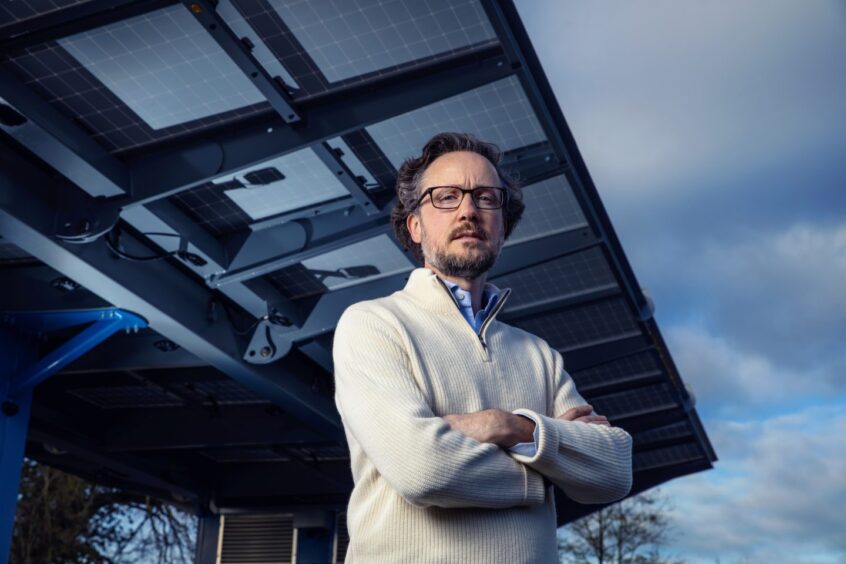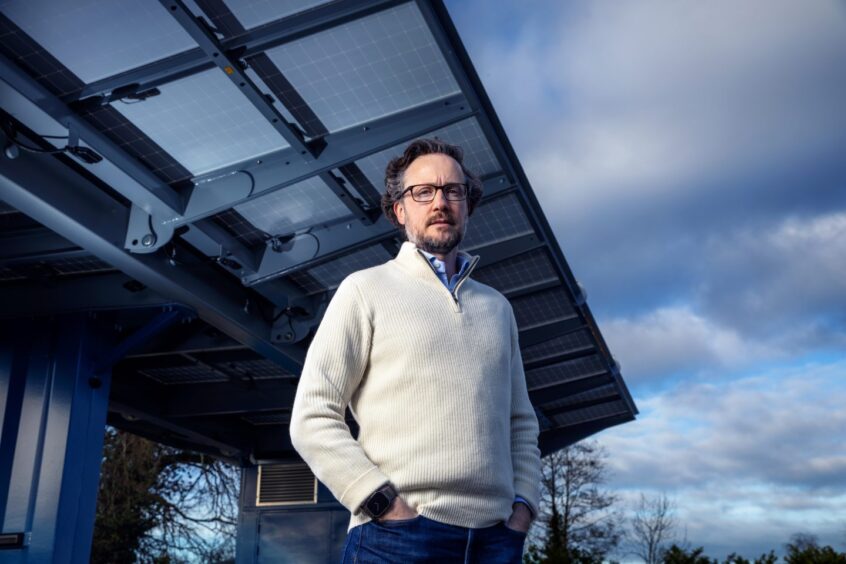 © Supplied by Photographer Eve Con
© Supplied by Photographer Eve Con Max Aitken has a richly studded career of investing in innovative clean energy start-ups. From an early investment in BP Pulse, to co-founding bioenergy company Estover, and solar carpark charging company 3ti, he was an early stakeholder in the energy transition.
Through his Aitken/Beaverbrook family office, Aitken invested in a nascent iteration of BP Pulse, the electric-charging network now owned by the oil company, when it was Chargemaster.
His latest venture, Beaverbrook Energy, is committed to providing energy services in growth sectors such as solar energy. The origin of the name is Lord Beaverbrook, his eponymous ancestor, who became knighted and set up the Daily Express newspaper.
Aitken believes that one day solar power will be the world’s dominant energy source. He is not alone in his view. Deutsche Bank is another that has predicted that most of the world’s power will eventually be derived from the sun. The debate around energy and security has been pushed right to the top of people’s minds and the political agenda since the energy crisis, according to Aitken.
“The thing about renewable energy is it, it pushes it away from the sort of invisible, centralised sources of energy, into people’s lives,” he explained in an interview.
“Ukraine, suddenly people thought about, ‘Where does our gas come from?’ ‘What drives those gas prices?’ People began to make a mental connection between turning the lights on and Putin smiling.”
‘Finally’
“People want to talk to me, finally,” Aitken said, noting that as prices began to rise, people realised that renewable energy is “everywhere”, and in future he predicts further expansion as prices fall.
“Certainly in 2009, no one went into it,” he said. “Now it’s kind of sexy.”
Aitken takes a circumspect approach to investment, but at the core of that is a strong desire for change, without being disillusioned or regretful of the past. Originally, he invested in the dotcom boom, with later investments including an oil and gas business in Oregon, USA, and a vertical salad farming business, GrowUp Farms.
When he grasped the implications of climate change, he said everything changed from there.
“Until you really get into it, you don’t realise just how much civilisation is built off oil and gas,” he said, adding it is “killing us”.
The prospect of a future without an energy transition is “enormously frightening”, according to Aitken.
“The science is worse than most people think it is,” he said. “Last year, we saw a record increase in carbon dioxide.”
The thing that keeps him awake at night is climate change; specifically Atlantic meridional overturning circulation (AMOC), an underwater heat transfer system in the Atlantic Ocean, which scientists say could collapse.
“We’re talking a fundamental change in everything if we don’t solve the problem,” Aitken said.
‘Closer’
But while the science may be ominous, the solutions are “closer”, according to the entrepreneur. He says we already have all the technology needed to solve the climate change problem, and believes that solar will be both the dominant, and the cheapest, form of energy generation technology in future.
Solar is expected to comprise 80% of new renewable energy production by the end of the decade, according to a report from October 2024 by the International Energy Agency.
Energy touches everything in our lives from business to transport to the home, all areas that are also being revolutionised by artificial intelligence, according to Aitken. But he is sceptical that AI will revolutionise the market for power in the way that some people fear.
“Whether AI actually eats all the world’s power remains to be seen,” he said. “AI is doing something, every time you make an AI query, it’s the equivalent energy of a bottle of water. But at the same time, if you had given that task to a human being, actually most analysis says it would take more energy.”
He said it will not necessarily be the current main producers of power that lead the way in the energy transition.
“Incumbent companies are good at one thing, not changing to be good at other things,” he said. “Western Union was one of the biggest companies in the world doing telegraph operators, a massive company. They should have dominated telephones, but they didn’t.”
To avoid spending money importing gas, Aitken predicts that countries will increasingly turn to solar power with battery storage as a way to deal with diminishing returns as the price of solar declines. From the point of view of investing, he spies growth potential in energy services and engineering.
“Solar is so ridiculously cheap now and it’s getting cheaper every year,” he said.
“Batteries are now finally completely viable and being rolled out in extraordinary quantities, and all thanks to China.”
Not only is solar is cheaper than wind, but wind also needs a lot of steel to be built, as well as parts, which makes solar less industrially intensive.
Most of the batteries used in solar are recyclable, according to Aitken, giving it another advantage over wind power. Among the pressure points in reaching the UK government’s ambitious clean power target for 2030 is “just an awful lot of engineering to be done in five years”, according to Aitken.
“Grid is a huge choke point because we need massive upgrades,” he said. “We’ve also got to just build a lot of generating capacity that takes time.”
What will move the needle, in Aitken’s view, in reaching those targets will be “picks and shovels”, or energy services, on engineering and construction projects.

